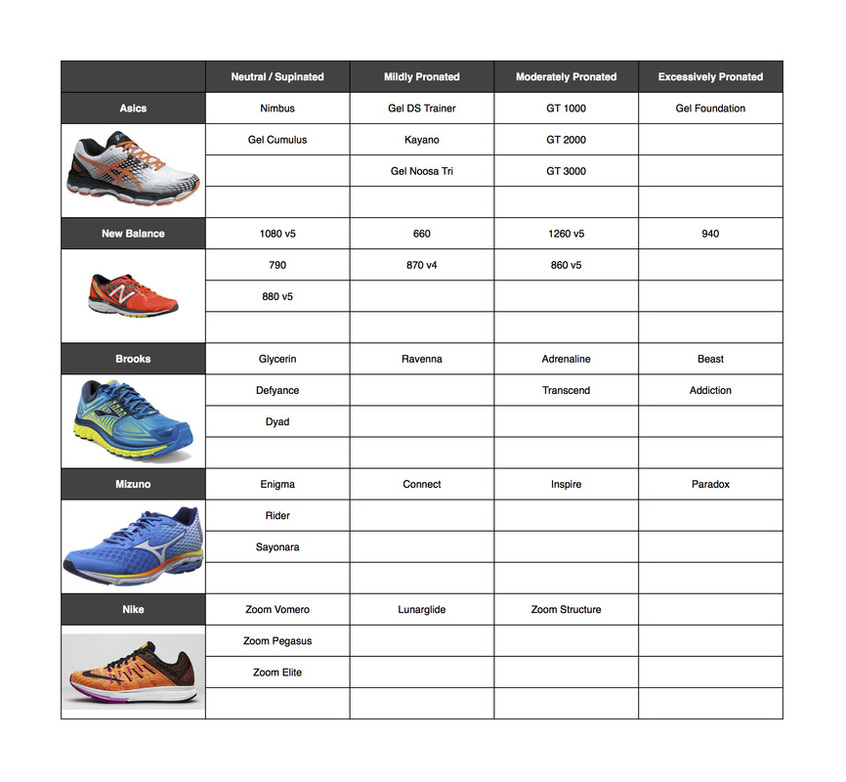Choosing a Running Shoe

At Podantics we treat a lot of people with running injuries especially around spring time when many of Adelaide's amateur runners are injured training for the city to bay fun run. Many of the injuries we see from running may have been prevented with proper training and a good pair of running shoes.
The purpose of a good running shoe is to protect the foot from harm, reduce the risk of injury and support the foot while running to help achieve your maximum potential.
If you consider that your feet strike the ground between 600-1,000 times per kilometre at 2.5-3.5 times your body weight while running, it follows that footwear plays a critical role in performance and injury prevention.
Running shoes that are improperly sized, unsuitable for your biomechanics or training needs, or those that have gone past their used-by-date can cause injury. Researchers have shown a significant correlation between infrequent changes of running shoes and injuries.
Why do I need a running shoe to run?
Running shoes are designed specifically for forward motion providing appropriate shock absorption and support to facilitate running.
Cross trainers on the other hand have no specific are of shock absorption and therefore aren’t as affective at reducing injury as traditional running shoes. Racing shoes, provide the light weight edge for racing but they don’t provide enough stability for every day wear or for long training runs. For those running more than 10-20km a week, it is often beneficial to alternate between a range of different running shoes to help reduce the potential of minor overuse injuries that might be caused by any one particular pair of shoes.
Shoe buying tips
The purpose of a good running shoe is to protect the foot from harm, reduce the risk of injury and support the foot while running to help achieve your maximum potential.
If you consider that your feet strike the ground between 600-1,000 times per kilometre at 2.5-3.5 times your body weight while running, it follows that footwear plays a critical role in performance and injury prevention.
Running shoes that are improperly sized, unsuitable for your biomechanics or training needs, or those that have gone past their used-by-date can cause injury. Researchers have shown a significant correlation between infrequent changes of running shoes and injuries.
Why do I need a running shoe to run?
Running shoes are designed specifically for forward motion providing appropriate shock absorption and support to facilitate running.
Cross trainers on the other hand have no specific are of shock absorption and therefore aren’t as affective at reducing injury as traditional running shoes. Racing shoes, provide the light weight edge for racing but they don’t provide enough stability for every day wear or for long training runs. For those running more than 10-20km a week, it is often beneficial to alternate between a range of different running shoes to help reduce the potential of minor overuse injuries that might be caused by any one particular pair of shoes.
Shoe buying tips
- Go to specialist running stores to get fitted properly.
- Wear the same socks that you intend to run in for a proper fitting.
- If you wear orthotics, make sure you bring them with you when you try on shoes and start with a "neutral" sneaker unless other wise advised.
- Buy your running shoes later on in the day or after a run when your foot is at its widest. The human foot tends to expand by a few millimetres and in some people it can expand up to 2cm at the end of the day.
- Get your feet measured every time you buy running shoes.
- Change your running shoes after 1,000km or at least every 6 months as the mid sole and the heel begins to degenerate. The shoes can still be worn for causal wear but are not suitable enough for the pressure of running.
- Make sure you have a finger width of span in the front of the shoe so your toes don’t hit the end of the shoe.
- Do not buy shoes that are too loose or too tight or constrictive in width or length.
- And most importantly, do not wear new running shoes for a race!
Related articles
- Summer Running
- Winter Running
- Sports Podiatry
- Orthoitics
- Heel Pain
> Back to Sports Centre



